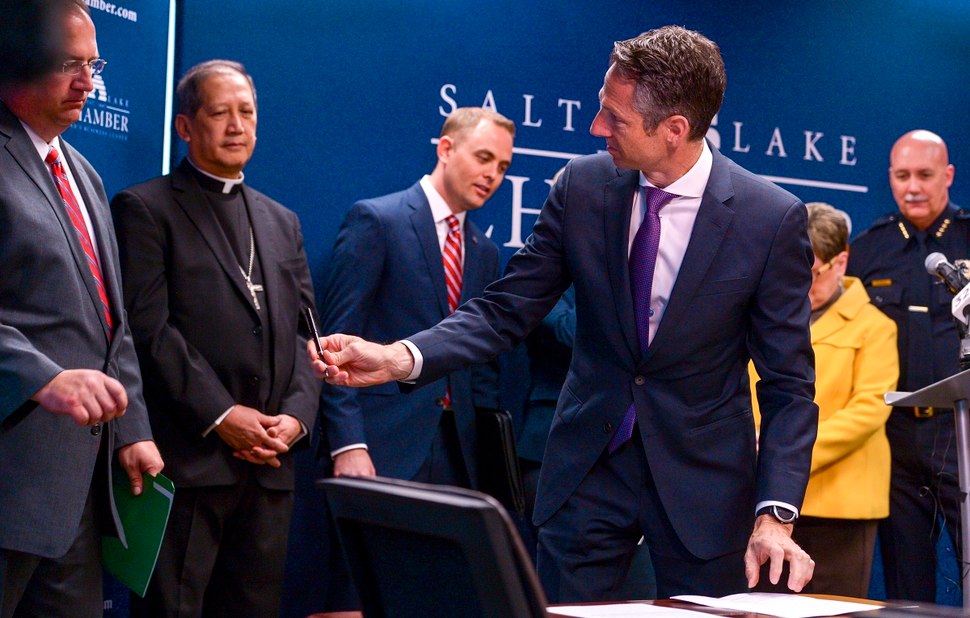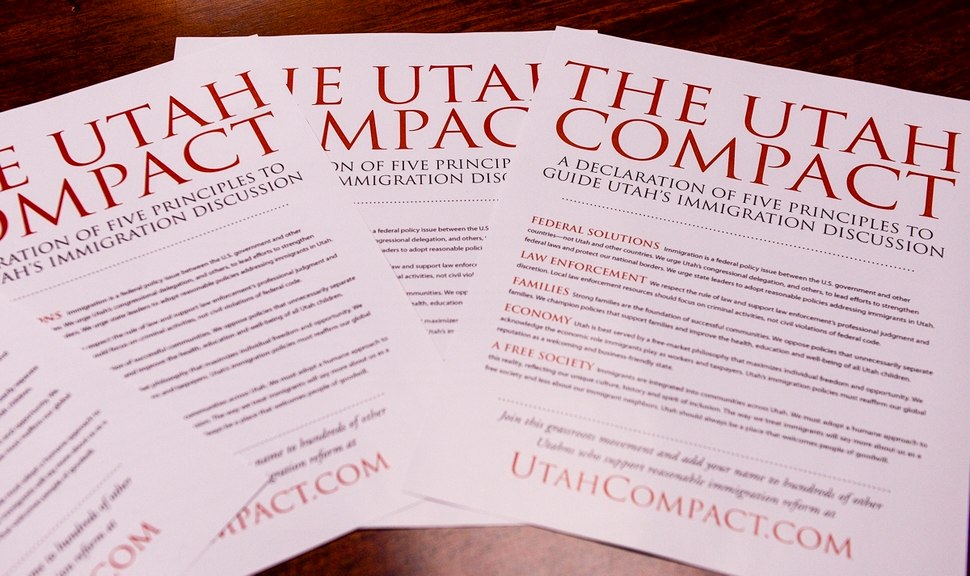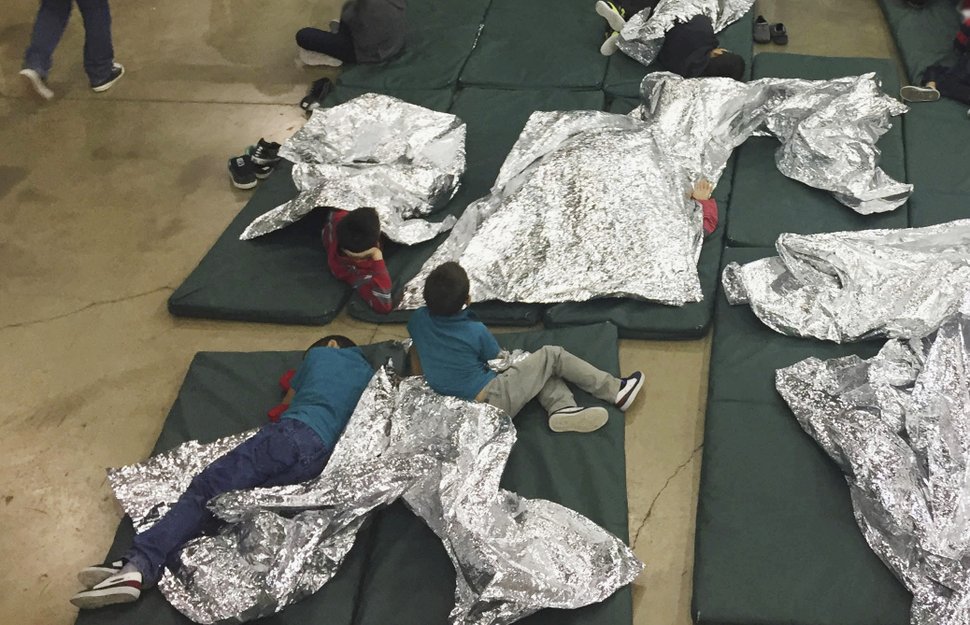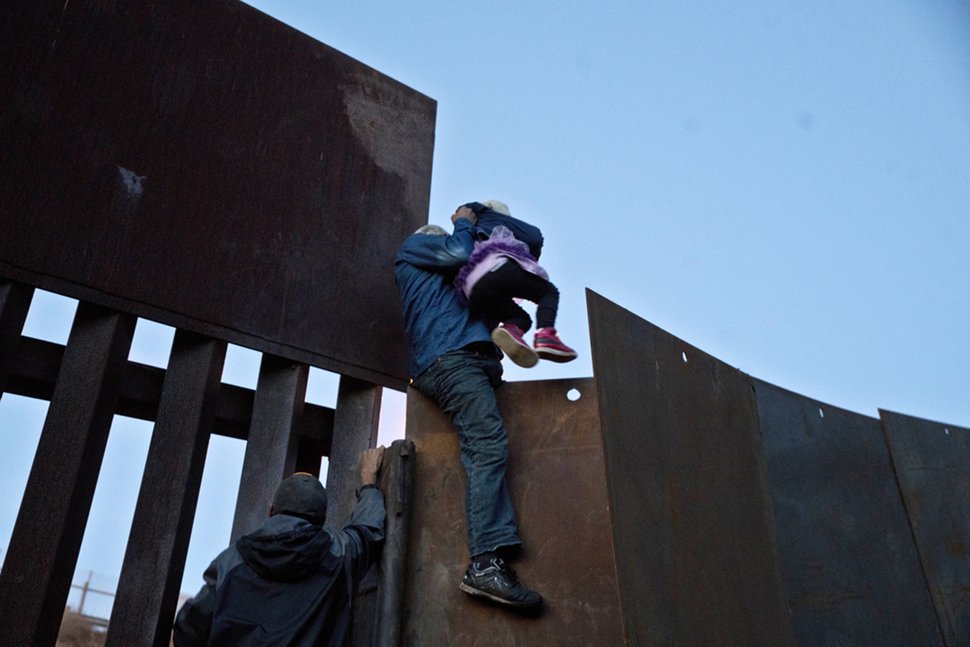Nearly a decade ago, when Utah immigration arguments grew vitriolic, a group of religious, civic and business leaders signed the Utah Compact. The document sought to cool debate by emphasizing humane treatment of immigrants, keeping families together and focusing deportation on serious criminals — an approach numerous other states later copied.

Immigration debates remain bitter, so the same groups gathered Thursday to sign the compact again to reaffirm that its principles could calmly help find solutions amid hot debates on everything from a wall along the Mexico border to immigrant detainment and whether immigrants who arrived as children should be allowed to remain.
“Today, nearly a decade later, our immigration system is still in need of significant reform,” Salt Lake Chamber President and CEO Derek Miller said. “And again, unfortunately, politics overshadow important policy decisions.”

Natalie Gochnour, an original signer who helped write the document and who is now associate dean of the University of Utah’s business school, said, “It’s clear that Utah has been a leader in setting what I would call a very balanced approach to immigration reform. And we are here today to invite a new generation of business leaders, community leaders, faith leaders, elected officials, educators and all Utahns to visit UtahCompact.com and add their names.”
One group that was visibly absent was The Church of Jesus Christ of Latter-day Saints. In 2010, the state’s predominant faith opted not to sign the compact but issued a news release endorsing it.
Miller said the church was invited to participate in Wednesday’s re-signing event. Church spokesman Doug Andersen said the Salt Lake City-based faith had difficulty clarifying the purpose of the meeting and did not want to become involved in specific political arguments on immigration. But, he added, “The church continues to be supportive of the compact and its principles.”
The Utah Compact
FEDERAL SOLUTIONS • Immigration is a federal policy issue between the U.S. government and other countries — not Utah and other countries. We urge Utah’s congressional delegation, and others, to lead efforts to strengthen federal laws and protect our national borders. We urge state leaders to adopt reasonable policies addressing immigrants in Utah.
LAW ENFORCEMENT • We respect the rule of law and support law enforcement’s professional judgment and discretion. Local law enforcement resources should focus on criminal activities, not civil violations of federal code.
FAMILIES • Strong families are the foundation of successful communities. We oppose policies that unnecessarily separate families. We champion policies that support families and improve the health, education and well-being of all Utah children.
ECONOMY • Utah is best served by a free-market philosophy that maximizes individual freedom and opportunity. We acknowledge the economic role immigrants play as workers and taxpayers. Utah’s immigration policies must reaffirm our global reputation as a welcoming and business-friendly state.
A FREE SOCIETY • Immigrants are integrated into communities across Utah. We must adopt a humane approach to this reality, reflecting our unique culture, history and spirit of inclusion. The way we treat immigrants will say more about us as a free society and less about our immigrant neighbors. Utah should always be a place that welcomes people of goodwill.
Other officials lined up at the event Wednesday to praise the compact’s principles, and sign it again.
Bishop Oscar A. Solis, leader of Utah’s 300,0000-plus Catholics, said the Diocese of Salt Lake City opposes separation of immigrant families and champions policies that benefit all children — including immigrants.
“Strong families are the foundation of successful communities,” he said. “That is why we oppose all policies that unnecessarily separate families. We champion policies that are supportive of families, that contribute to the welfare and well-being of all children.”

Immigration attorney Timothy Wheelwright pointed to the compact’s first principle that stresses immigration is a federal issue that must be solved primarily by Congress.
“Every day, I see firsthand just how broken and dysfunctional our immigration system is,” he said. “While most of the public is debating whether to construct a physical wall along the U.S.-Mexico border, the president and the administration are simultaneously pursuing policies … establishing a virtual wall directed at even legal immigration, not to mention the humanitarian crisis at the border, the separation of families and a bloated immigration court system that cannot handle its current caseload.”

Wheelwright said Congress has been missing in action on the issue and called on the Utah delegation to help remedy that. “The only solution to a broken immigration system is a federal solution, which means that the U.S. Congress — not the president, not the courts — must enact meaningful, substantive and, dare I say, even comprehensive immigration reform.”
Salt Lake City Police Chief Mike Brown heralded the compact principle that says local law enforcement resources should focus on criminal activities, not civil violations of federal code such as undocumented immigration.
“Police officers must maintain the trust of the communities we protect,” he said. “If police officers are forced to detect and detain immigrants who are here without authorization, this trust is easily broken” and “makes the compassionate service provided by law enforcement officers throughout this country less legitimate.”
Miles Hansen, president and CEO of World Trade Center Utah, noted a compact principle that said immigrants play an important economic role here.
“Utah is home to just under 13,000 foreign-born entrepreneurs who employ more than 38,000 Utahns,” he said. In 2017, studies showed that “immigrants in Utah held $5.3 billion in spending power and paid nearly $540 million in state and local taxes.”
Paula Green Johnson, board member of the United Way of Salt Lake, praised the compact’s call for a humane approach to immigrants.
“The United States is a nation built by industrious and brave immigrants, who created a better future for the next generation … not unlike the immigrants showing up at our borders today,” she said. “Now is the time to open our arms and hearts…. Now is the time for our leaders to stand up and fix our broken immigration laws. We deserve an immigration policy that welcomes people of goodwill from all over the world.”
Amid the speeches and signing, Envision Utah CEO Robert Grow said, “I hope we don’t have to come back here in 10 years and sign it again” and that the immigration battles soon will be resolved.
